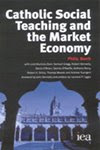Ignorance is strength
Schutz over at Sentire Cum Ecclesia notes a strange phenomenon:When I hear an opinion expressed that shows signs of not having been
As Schutz notes, this is fair enough as far as it goes, but the response avoids the issue. No-one suggests that an opinion can't be expressed. What is at issue is whether the opinion should be taken seriously. And it's tough to take an opinion seriously if it owner won't defend it in a serious way.
sufficiently thought through, I cannot resist embarking upon an examination of
the opinion....I usually receive one or both of the following
reactions:
1) Everyone is/I am entitled to their/my own opinion.
2) I don't have to justify myself to you.
Underlying this phenomenon is a deep cultural problem. The Enlightenment project was launched on the promise that a purely rational basis for moral knowledge could be found, one that did not depend on either religious authority or traditional natural law. Successive attempts to realise that project have failed, leading to the collapse of moral reasoning and a growing conviction that moral statements are simply statements of feeling, without any rational basis. In the prevailing emotivist ethos, moral statements aren't seen a propositions that must meet some external standard of truth.
In such a culture, any questioning of propositions is taken as a personal affront to a person's feelings. And any claim to be seeking the truth by testing propositions can only be a tactical move, made in bad faith.
The corollary of emotivism is the denial that there is any kind of "public reason" that can be used to test moral statements made in the public domain. Alistair MacIntyre, in his book After Virtue, developed the consequences of this fact in detail, and used it to explain why moral debate in Western societies is likely to remain both shrill and inconclusive.
Which places a responsibility on Christians to find better language that can express moral truth in compelling ways. Scripture suggests that philosophy won't be the vehicle for this; when Paul attempted to reason with the Greeks, he failed. At the end of his book, MacIntyre pins his hopes on the emergence of new moral communities within which virtue can thrive. A life lived in Christ "speaks" with a conviction that mere words cannot convey, and changes minds. Those same lives, lived together, can change the world.





No comments:
Post a Comment